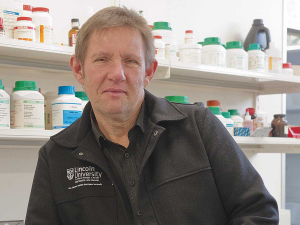Wired for Science: Understanding the feeding habits of mealybug
Fussy children might be frustrating, but fussy mealybugs could help protect the New Zealand wine industry from grapevine leafroll-associated virus 3.
 NZIAHS president Jon Hickford says scientists are getting hot under the collar over the way regenerative agriculture was being uncritically embraced.
NZIAHS president Jon Hickford says scientists are getting hot under the collar over the way regenerative agriculture was being uncritically embraced.
New Zealand agriculture doesn't need "the latest fad from America," according to New Zealand Institute of Agricultural and Horticultural Science (NZIAHS) president, Jon Hickford.
Hickford, a professor at Lincoln University, was commenting on the release of a special edition of the NZIAHS magazine AgScience, in which several prominent scientists pull no punches in examining the claims of regenerative agriculture.
He told Rural News scientists were getting hot under the collar over the way regenerative agriculture was being uncritically embraced.
"For some time, we have been disquieted by the ballyhoo in support of regenerative agriculture in the absence of scientific studies into the implications of applying these practices to farm practices in this country," Hickford told Rural News.
"A sound evidence base is needed to test and confirm what works in New Zealand soils, climates, and farming systems."
He says Regen Ag was becoming a political issue, with the central plank of Green Party agriculture policy for New Zealand to go entirely into regenerative agriculture. Hickford says it is also coming through in Labour Party - and thus Government - policy, with "money starting to be thrown at it".
"I'd gladly give a dollar to find out what their definition of regenerative agriculture is," he adds. "There is no definition."
Hickford says the phrase 'regenerative agriculture' sounded appealing, espectially to urban people who don't understand the complexity of farming systems.
But he claims that inherent in the term is the suggestion that our current systems must be damaged and in need of regeneration.
"Actually, what we're doing is pretty good. We could do a little bit better here, and maybe a bit more there, but the system's not broken and we don't need the latest fad from America."
Hickford says the special edition of AgScience examines regenerative agriculture in ways that were comprehensive and based on “good old-fashioned, boring science”.
“As the more outrageous claims are made by the regenerative agriculture fraternity we can say ‘well, actually the science doesn’t support that’.”
Hickford says a key argument of regenerative agriculture appeared to be a belief that we needed to get a lot more carbon into our soil.
But says it is “untrue” that most of our soils are depleted in carbon and there was “not a lot of evidence” that changing to regenerative systems would improve things.
“It (Regen Ag) seems to be promoted as a pan acea but there was no magic regenerative off-the-shelf product or process,” Hickford adds.
He says while American agriculture is having to go back to pastoralism to repair depleted soils, a lot of New Zealand farmers were already doing regenerative practices.
“We are not disturbing the soil anything like as much as in some other parts of the world.”
In his conclusion, to the AgScience publication, Hickford says there was probably a place for regenerative agriculture.
“If it is accepted as a defined system, then that system must be auditable, with clear evidence provided of benefit, be it in food quality, environmental impact or profitability,” he explains.
“Wishing your system to be better is not enough, because it must be demonstrably and reliably better.”
A number of regen ag claims questioned by experts
The publication of the AgScience special edition coincided with a MPI call for proposals for projects to investigate regenerative farming practices, to be funded through its Sustainable Food & Fibre Futures co-investment fund (SFFF), which Hickford says couldn’t come soon enough.
Among the contributors to the special edition are:
The magazine is online at https://indd.adobe.com/view/693a575a-5482-4df0-bc4d-f986d3bce648
There was much theatre in the Beehive before the Government's new Resource Management Act (RMA) reform bills were introduced into Parliament last week.
The government has unveiled yet another move which it claims will unlock the potential of the country’s cities and region.
The government is hailing the news that food and fibre exports are predicted to reach a record $62 billion in the next year.
The final Global Dairy Trade (GDT) auction has delivered bad news for dairy farmers.
One person intimately involved in the new legislation to replace the Resource Management Act (RMA) is the outgoing chief executive of the Ministry for the Environment, James Palmer, who's also worked in local government.
T&G Global says its 2025 New Zealand apple season has delivered higher returns for growers, reflecting strong global consumer demand and pricing across its Envy and Jazz apple brands.

OPINION: The release of the Natural Environment Bill and Planning Bill to replace the Resource Management Act is a red-letter day…
OPINION: Federated Farmers has launched a new campaign, swapping ‘The Twelve Days of Christmas’ for ‘The Twelve Pests of Christmas’ to…